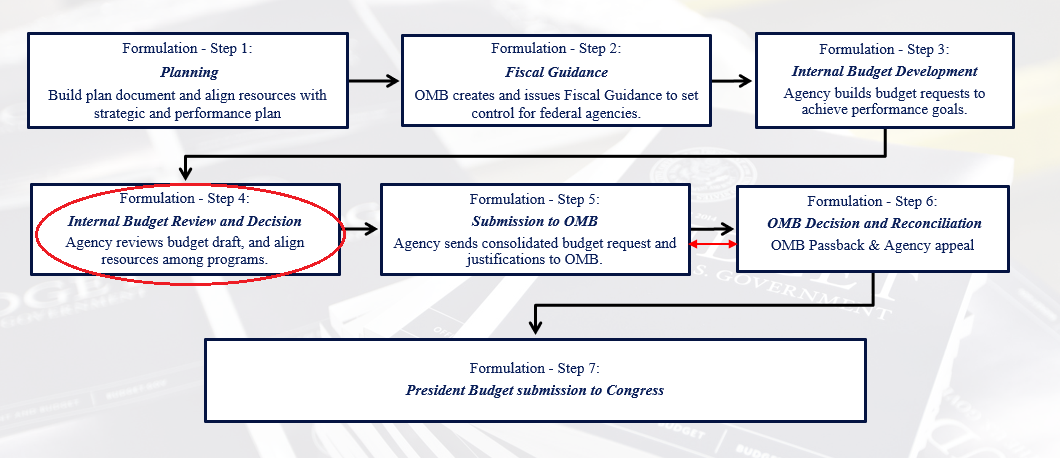Formulation - Step 4: Internal Budget Review and Decision

Due to many reasons and operation environment changes, agency and its components may face fiscal constraints to carry out operations within the limited time period. Sometime, agency and its components may decide to look inside to make trade off, delay execution, improve operation efficiency to fund other emerging priorities. However, the option may not always the choice. Agency and its components may have to seek additional resource beyond what are allocated to their resources. Competitions among them for limited resources are rough. The key factors to make a strong case to help them win the competitions are essential to their operation outcomes.
Agency and its components should prepare themselves by:
- 1. Be familiar with agency and OMB’s review and decision process and timeline, with consideration of current and future fiscal and political environment;
- 2. Find the root causes of the lacking of fiscal resource;
- 3. Align the emerging requirements and/or unfunded requirements with the agency, OMB, and the Administration’s strategic and performance plan if applicable;
- 4. Align the emerging requirements with operation environment or legislative changes if applicable;
- 5. Adopt data-driven culture, conduct extensive analysis to show the clear trail of needs;
- 6. Adopt analytic storytelling method, and develop a strong case and position on what and how to ask for it, and;
- 7. Show approval of historical performance outcomes with cost saving or revenue/benefit generated;
- 8. Be consistent with promoting agency’s mission and seek public, political, and legislative influence.
Agency should also realize the budget decision can be a political decision. The agency should develop a strategy on how to approach OMBs and the Administration based on historical information, emerging environment, and even political considerations, including the relationship between agency’s leadership with OMB leadership.
Agency can raise the issue as early as the “Spring Guidance” been given in late spring, and may continue to seek solution as the budget review process starts in September at OMB. There is also policy initiative driven emerging requirement, which can be process as late as December or January, and often resolved at Cabinet Secretaries level, and may elevated to the President and White House senior advisors. Once PB is in the final phase of development, it’s practically impossible to make changes, but supplemental requests can still be the last effort to take.
Some agencies, particularly large agencies, have established internal issue review and approval process to address and resolve budget issue internally. Agency review components’ issue nomination at working groups level with participants from program and budget, and technical subject matter experts on the topics. The outputs of the working group are a consolidated list of prioritized requirements and recommendations for agency’s head to make a decision.
Previous: Formulation - Step 3: Internal Budget Request Next: Formulation - Step 5: Submission to OMB